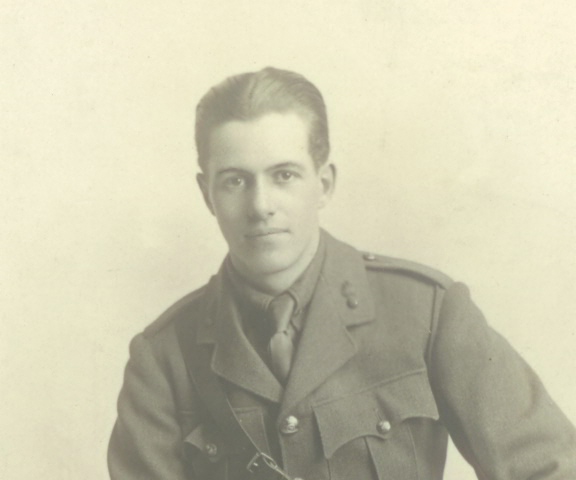
| Dennis Wheatley: An Introduction |
Dennis Yates Wheatley was born into a prosperous middle-class family of London wine merchants on 8th January 1897.
At the age of 8 he was sent to a prep school on the South Coast (where his gift for storytelling first emerged, when he entertained the boys with stories after ‘lights out’) and then to Dulwich College (1909-1910), from which he was expelled. He was then sent to the physically hard Royal Naval training ship HMS Worcester to complete his education. After this the intention was that he would spend time in each of the major wine making countries to learn the business, but he only managed six months with a wine merchant in Traben-Trarbach in Germany before World War I intervened.

Dennis Wheatley in World War I
Like many of his contemporaries, DW was keen to join up but he found it hard to find a regiment. Eventually he was accepted by the Royal Artillery Company. He was in England until February 1917, and life was a mixture of excitement and boredom. He caught bronchitis in an exercise on Salisbury Plain in January 1917 and this was a blessing in disguise because it prevented his accepting a commission from a General who hated him which would almost certainly have led to his death within a few weeks.
Providence took a hand because when he had recuperated he was sent to a camp at Luton where he met a cultured conman called Gordon Eric Gordon Tombe. GEGT took DW under his wing and taught him about life, sex, world religions and modern and classical literature. He very much shaped the man DW was to become, and without him DW’s life might have taken a very different turn.
DW was finally sent to France in August 1917 and saw his fair share of grisly deaths – both of men and of horses. At one stage according to his autobiography briefly and by chance he ended up commanding over one thousand men. He was gassed in May 1918 and sent home to die, but recovered.
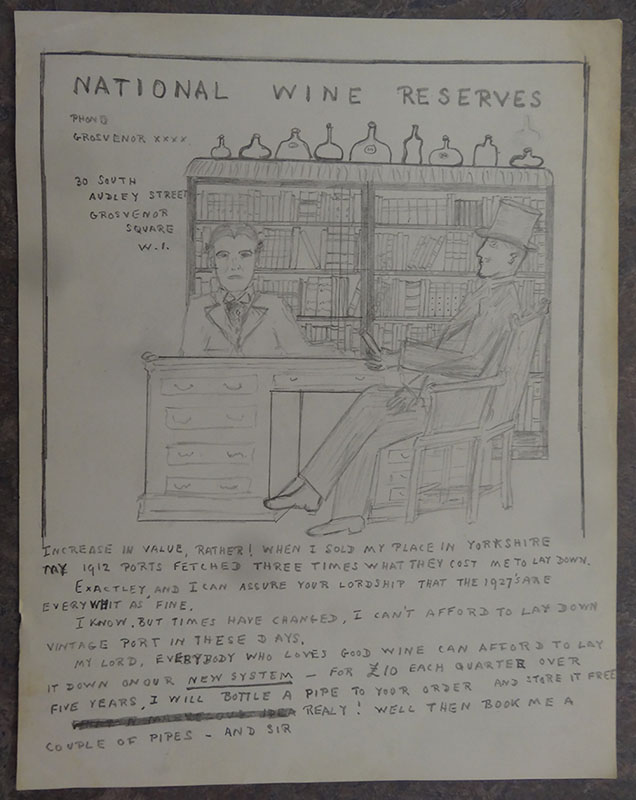
Reproduced with the permission of Special Collections, Leeds University Library (MS1942),
and with thanks to the Wheatley family.
After the War, DW joined the family wine business in Mayfair and with considerable promotional flair he took it steadily up market. He sold liqueurs and ultra-rare brandies, and at its peak the business counted not only the Duke of York (later King George VI) but a total of ‘three Kings, twenty one Imperial, Royal and Serene Highnesses, twelve British Ducal Houses, the Archbishop of Canterbury and a score of millionaires’ among its clientele.
DW married his first wife in 1922 and they had a son; but they divorced in 1931 and DW married his second wife Joan, to whom he remained married for the rest of his life.
During this period there was a secret tragedy – Gordon Tombe disappeared in April 1922 and DW could not find out what had happened to him. In fact he had been murdered by a business colleague. When the body was discovered in September 1923, the police investigation was headline news. DW was fortunate not to be caught up in the investigation and followed the case extremely closely.
When the Great Depression hit, DW was financially over-extended, faced near bankruptcy, and was forced to sell his wine business. Knowing his love of telling tales, his wife suggested he write a book.
|
|
| First editions of |
|
DW wrote a detective novel called ‘Three Inquisitive People’ which introduced the Duke de Richleau and his friends and it was accepted for publication by Hutchinson, who were to be his publishers for the rest of his life. Before the book could be published he wrote a second book, an adventure story set in Russia and featuring the same set of heroes - ‘The Forbidden Territory’. Hutchinson decided this was a better novel and should be published first. With DW promoting it heavily to his friends, it was launched on 3rd January 1933. It was an immediate bestseller, and was reprinted seven times in seven weeks. DW’s career as an author had taken off.
He followed this with an ‘out of series’ novel which he wrote in a fortnight, and then went back to the writing of impeccably researched novels with ‘Black August’, which featured his second principal hero Gregory Sallust, and ‘The Fabulous Valley’. In 1934 DW wrote an Occult novel, ‘The Devil Rides Out’. Phil Baker rates it as the best occult novel of the twentieth century, and it is his most famous work.
Other novels followed, all best-sellers, until the outbreak of World War II.
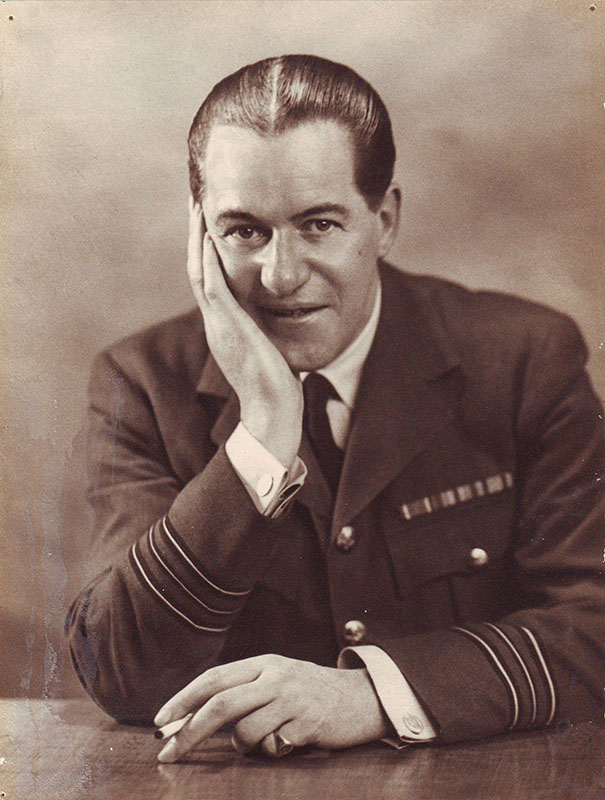
Wing Commander Dennis Wheatley
The early stages of World War II were frustrating for DW. As an old soldier he wanted to join up again, but now in his forties, he was too old.
DW wrote to the Ministry of Information twice seeking a job in propaganda, but he didn't even receive the courtesy of a reply. His old friend Maxwell Knight in MI5 suggested he keep writing novels to keep the public’s minds off the ghastliness to come, and this he did.
With his typical flair for innovation he resurrected his hero Gregory Sallust as a secret agent working against the Nazis using contemporary wartime events as his backdrop, and once again the books were immediate bestsellers.
DW still hankered to 'get into the war', and his break came through an almost fantastic sequence of events. His wife had become a driver for MI5, and as the battle for Dunkirk was starting, she happened to have a Captain Hubert Stringer in the back of the car. He confided to her that he had been tasked to come up with ideas to resist invasion (which was considered by many of the top brass to be imminent), and that he was struggling. DW's wife replied 'Why don't you ask my husband ? His speciality is original ideas, and he would simply jump at the chance of trying to make himself useful.’
Duly invited, DW wrote a 7,000 word paper in less than fourteen hours. He could hardly have imagined what followed. Given permission to pass it on, DW copied it to three of his most well connected friends. One read it with interest, one invited him to the War Office at midnight and informed him that his paper would reach the Vice-Chief of the Imperial General Staff, and another, the King's confidant Sir Louis Greig, invited him to a lunch at the Dorchester where he was asked to write a second paper - on what he would do if he was on the other side, and looking at how best to invade Britain for the German High Command.
In the ensuing year or so, operating in Top Secret, as well as writing his novels, DW acted as a one-man think-tank for the military high command, writing some twenty papers on subjects as diverse as how to maintain morale in the periods of deepest despair in the War to how Europe should be re-constituted should the Allies ever win.
All this was done as a civilian, but in the winter of 1941 it was decided DW should go nominally into uniform, and be commissioned into the Royal Air Force. Seeing who his sponsors were, the interviewer knew that something special must be planned for him, and said 'there is clearly no need for me to ask you any questions; why don't you ask me some?'.
DW was actually to become involved in Deception Planning, but things got off to a very slow start as the High Command hadn't really worked out how to use this resource.
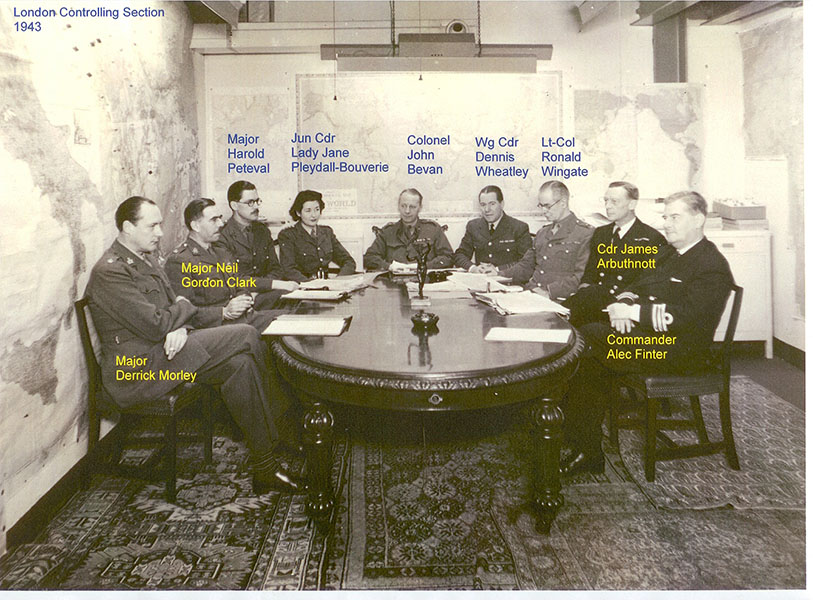
The London Controlling Section
Things only got going when DW was given a new commander, Colonel Johnny Bevan, who was both well connected (he was a personal friend of Field Marshal Alanbrooke) and super-smart. Between them they got themselves taken seriously, and when the time came for Operation Torch ( the re-taking of French North Africa) in late 1942, the two of them were responsible for coming up with the (totally successful) cover plans.
Their team, known by the deliberately obscure title of 'The London Controlling Section' eventually became seven strong, and was later responsible not only for implementing the plans for 'Monty's double' and for 'The Man Who Never Was', but for devising the 'D Day' plans under which the Germans would be persuaded that there was a First United States Army Group (FUSAG) (which there wasn't), and that its destination was the Pas de Calais rather than the beaches of Normandy.
The London Controlling Section's top secret operations were so successful that its official letter of thanks at the end of the War referred to its 'outstanding contribution', and to it ‘having made a decisive contribution to the success of a major operation, namely the Allies return to the Continent in June 1944’. Official estimates of the time considered that in the Normandy landings alone the group's stratagems pinned down some 400,000 enemy forces where they were not required, facilitating the landings, preventing even larger casualties, and helping in a very material way to procure victory for the Allies.
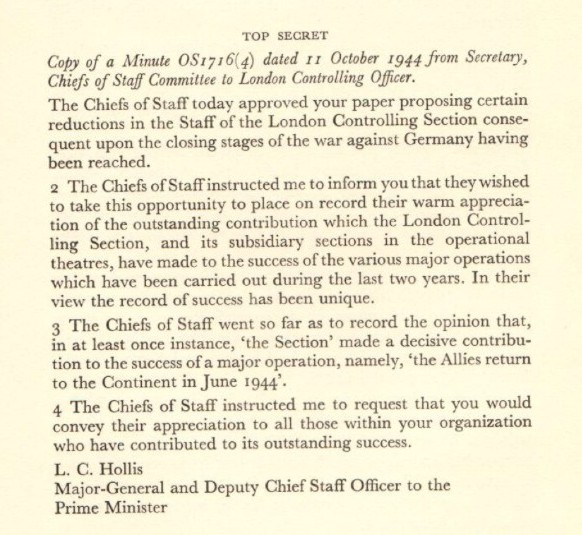
The official memo of thanks to the
London Controlling Section
Not bad work, DW later reflected, for a seven-man team.
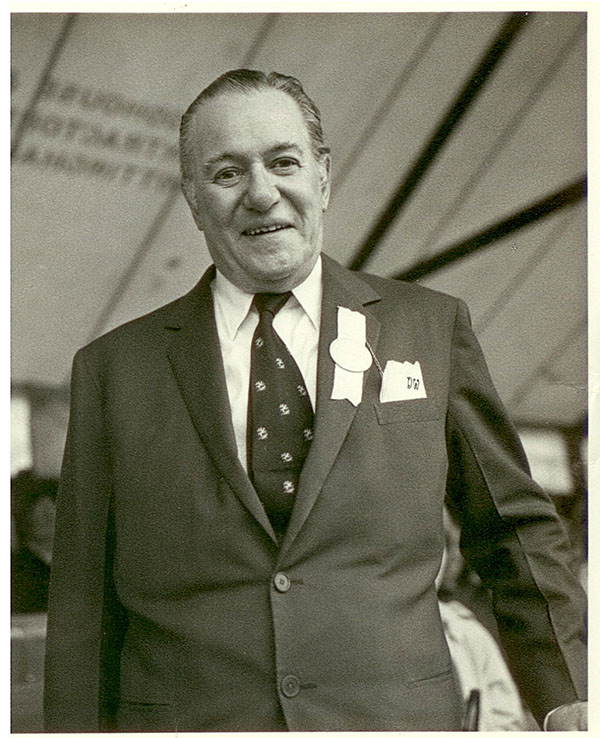
DW as President of the Lymington Show in the late 1960s
After the War, DW bought a mini country mansion in seaside Lymington in Hampshire, and he continued to write books, introducing a third principal character, Roger Brook, whose exploits took place in the Napoleonic era so DW would not be tempted to reveal contemporary secrets by mistake. He worked hard and to a well-disciplined routine. For around eight months of the year DW would devote himself to his writings. He would rise mid-morning and sometimes go to bed well after midnight, depending on how his writing was going. He took the remaining months off to go travelling, partly for pleasure and partly to research his next books. In the days when international travel was a distinct privilege, DW went round the world twice, and used countries as diverse as Sri Lanka, Mexico and Egypt as backdrops for his books.
During this time several of his books were filmed by Hammer, the most famous being ‘The Devil Rides Out’ with his friend Sir Christopher Lee playing the role of the Duke, a role which he enjoyed enormously.
DW was a born collector and collected many things; but he is particularly famous for his library, which contained an impressive array of signed first editions of twentieth century fiction as well as many hundreds of books (some very rare) that he used in his research.
A stream of his friends - including a host of wartime 'top brass' - came down for stays with him in Lymington or kept up a long-term correspondence, and he was renowned for answering fan mail, almost always giving his correspondents helpful and personal replies.
As DW got older, understandably he became less active. He moved back to London full-time in 1968, and started writing his autobiography. There were five volumes but these were abridged into four after his death, with only the first volume being published while he was alive.
DW died on 10th November 1977, aged 80, and his ashes were buried in Brookwood cemetery.
DW wrote sixty five books in all, with fifty six being novels and the remainder non-fiction. Eleven featured the Duke de Richleau, eleven Gregory Sallust, and twelve involved Roger Brook. Some nine of these are considered 'Black Magic' novels - a genre for which DW is particularly famous.
In addition DW wrote with his friend JG Links four 'Crime Dossiers' in which readers were provided with physical clues (strands of hair etc) and invited to solve a crime for themselves. The identity of the real murderer was contained in a sealed envelope at the back; and he also devised three Board Games (two of these in World War II).
Additionally, he was secretly commissioned by the Foreign Office in the 1950s to produce a novel for the Arab market extolling the virtues of Islam over Communism. Only one copy of the Arabic version is known and it has never been published in English.
By the nineteen sixties, DW was selling over a million copies of his novels a year; his work was sold in around twenty nine countries and translated into over twenty eight languages, and altogether he is estimated to have sold something like fifty million copies of his books in his lifetime.
While some of his first editions fetch enormous prices (in 2017, Sir Christopher Lee's copy of 'The Devil Rides Out' was put on the market for £30,000, and his own specially bound set of his own works was sold initially to the Getty Library and more recently in 2015 for £20,000), his book sales since his death have slowed down very considerably. This is partly because - with the exception of a few novels such as The Devil Rides Out – his books were never comprehensively filmed; unlike, say, the books of Agatha Christie or Ian Fleming. The now ‘old fashioned’ background to the novels may also have contributed, but this has not prevented the resurrection of other authors of the era. It may well be that if some of the books are filmed – and particularly if some of his Black Magic novels are filmed using CGI - he will once again become world famous. DW’s novels are all available electronically, his (699 page) biography has been written by the well-known biographer Phil Baker, and Pulitzer Prize winning author Tina Rosenberg has written about DW’s work as a wartime Deception Planner in an e-Book. These are all helping to introduce DW to fresh audiences.
People are accordingly coming to appreciate once again DW’s importance as an author to the fabric of British life in the 1930s to 1970s and to the perception of Britain overseas through the overseas sales of his translated works, and perhaps more importantly the vital contribution that he and a small handful of colleagues made to some of the most important Allied victories in World War II.
CTHB
31st December 2017
For a comprehensive account of DW’s life, see the site’s ‘virtual Museum’
This page last updated Copyright © 2002-2006 Bob Rothwell. 2007-2026 Charles Beck.